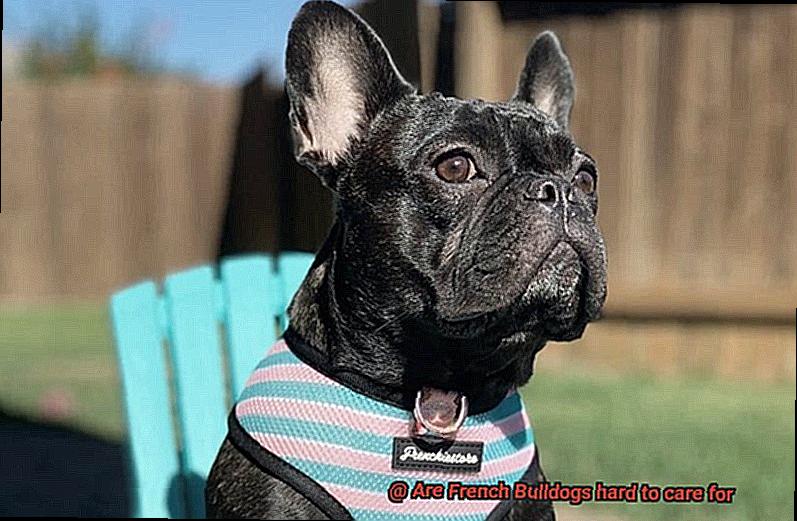Are French Bulldogs hard to care for?
Owning a dog is an incredibly rewarding experience, but finding the perfect breed for your lifestyle can be a challenge. That’s where the irresistible charm of French Bulldogs comes in. These little bundles of joy are bursting with personality, but are they hard to care for? Fear not, because French Bulldogs are surprisingly low-maintenance pets.
Unlike some breeds that demand constant attention and effort, French Bulldogs are a delightful exception. These compact canines are known for their adaptability and ability to thrive in various living arrangements. In this blog post, we’ll dive into the reasons why French Bulldogs make caring for them a breeze and debunk any misconceptions along the way.
Get ready to fall head over heels for these wrinkled darlings as we uncover the secrets to providing them with top-notch care. Together, we’ll create a harmonious and blissful life for both you and your furry friend. So let’s jump right in and discover the joys of sharing your world with a French Bulldog.
Exercise Requirements for French Bulldogs
Contents
- 1 Exercise Requirements for French Bulldogs
- 2 Grooming Needs of French Bulldogs
- 3 Common Health Issues in French Bulldogs
- 4 Heatstroke Prevention for Frenchies
- 5 Allergies and Respiratory Problems in French Bulldogs
- 6 Joint Problems in French Bulldogs
- 7 The Importance of Veterinary Care for French Bulldogs
- 8 Training Your Frenchie: Tips and Techniques
- 9 Conclusion
French Bulldogs are known for their comical personalities and adorable looks. As a proud owner of a French Bulldog myself, I understand the importance of keeping these lovable pups fit and healthy. While Frenchies may not require as much exercise as some other breeds, it’s essential to provide them with the right amount of physical activity to maintain their overall well-being. In this guide, I’ll share my expertise and personal experiences to help you navigate the exercise requirements for your French Bulldog companion.
Understanding Their Needs:
French Bulldogs are a brachycephalic breed, which means they have a shortened skull and a flatter face. This anatomical feature makes it crucial to be mindful of their exercise limitations. Their exercise needs are lower compared to more active breeds due to their potential breathing difficulties and heat sensitivity. However, this doesn’t mean they should be couch potatoes.
Daily Walks:
A daily walk is an excellent way to keep your Frenchie active without putting too much strain on their respiratory system. Aim for two short walks of 10-15 minutes each or one longer walk of 20-30 minutes. Take advantage of the cooler parts of the day, such as early morning or evening, to prevent overheating.
Interactive Playtime:
French Bulldogs love playtime. Engage them in interactive games like fetch or tug-of-war to stimulate their minds and keep them physically active. Make sure to monitor their breathing and energy levels during playtime to avoid overexertion. Remember, short bursts of play are better than prolonged sessions.

Swimming:
If your Frenchie enjoys water, swimming can be a fantastic low-impact exercise option. It helps keep them cool during hot weather while providing gentle exercise for their muscles. Always introduce them to water gradually and consider using a life jacket for added safety, especially if they are not natural swimmers.
Mental Stimulation:
In addition to physical exercise, it’s essential to provide mental stimulation for your Frenchie. Puzzle toys, treat-dispensing toys, and obedience training sessions can help keep their minds engaged and prevent boredom. Mental stimulation is just as important as physical exercise for their overall well-being.
Tailor Exercise to Their Individual Needs:
Remember that each French Bulldog is unique, and their exercise requirements may vary based on factors like age, health, and fitness level. Consult with your veterinarian to create a tailored exercise plan that suits your Frenchie’s specific needs.
Grooming Needs of French Bulldogs

From brushing to cleaning those adorable wrinkles, we’ve got you covered. So, let’s dive right in and ensure your Frenchie is always at their best.
Brushing like a Pro:
Just because Frenchies have short coats doesn’t mean they don’t need some TLC. Regular brushing with a soft brush or grooming mitt will help remove loose hairs and keep their coat shiny. Plus, it’s a great opportunity for some bonding time with your furry friend. Don’t forget to reward them with a treat for being such a good sport.
Ears that Hear:
Frenchies’ unique ear shape makes them prone to infections, so regular ear cleaning is a must. Gently wipe their ears with a dog-friendly ear cleaning solution to keep them clean and prevent any unpleasant odors or redness. Trust me, your Frenchie will thank you for it.
Dazzling Dental Hygiene:
A pearly white smile is not just for humans. French Bulldogs are prone to dental issues, so be sure to brush their teeth regularly with a dog-friendly toothpaste and toothbrush. It’s also a great excuse to show off their adorable toothy grin.
Wrinkle Care 101:
Those cute wrinkles on your Frenchie’s face need some extra attention. Keep them clean and dry by gently wiping them with a damp cloth or using specialized wipes designed for folds. This will help prevent any irritation or funky smells from developing.
Nail ‘Em Right:
Trimming those nails is an important part of grooming for any pup, including French Bulldogs. Overgrown nails can cause discomfort and even affect their mobility. If you’re not confident in doing it yourself, seek help from a professional groomer or veterinarian to keep those nails in tip-top shape.
Bath Time Bliss:
While French Bulldogs may not need frequent baths, they still appreciate a good scrub now and then. Opt for a mild, dog-specific shampoo and make sure to rinse thoroughly to avoid any residue irritation. Pro tip: use a non-slip mat in the tub to prevent any Frenchie-induced water ballet performances.
Common Health Issues in French Bulldogs
French Bulldogs, those adorable little squishy-faced bundles of joy, are not immune to health issues. As a proud Frenchie owner myself, I’ve learned a thing or two about the common health problems that can affect these lovable pups. So, grab a cup of coffee, snuggle up with your Frenchie, and let’s dive into the world of French Bulldog health.
- Brachycephalic Syndrome – The struggle is real for our flat-faced friends. Their short noses and compact skulls can lead to breathing difficulties, snoring that could rival a chainsaw, and trouble regulating body temperature. Make sure your Frenchie has access to a cool environment and keep an eye out for any signs of respiratory distress.
- Allergies – Just like us humans, Frenchies can suffer from allergies too. From itchy skin to tummy troubles, allergies can make life uncomfortable for our furry friends. Keep an eye out for any signs of discomfort and work with your vet to identify the source of the allergy.
- Eye Issues – Those big, expressive eyes are one of the Frenchie’s most endearing features, but they can also be prone to certain conditions. Cherry eye, cataracts, and dry eye are just a few of the eye issues that French Bulldogs may experience. Regular check-ups with your veterinarian will help catch any problems early on.
- Joint Problems – Frenchies may be small in size, but they can still suffer from joint and bone disorders. Hip dysplasia and patellar luxation are two common issues that can cause pain and mobility problems for your Frenchie. Keep them at a healthy weight and provide them with regular exercise to help keep those joints in tip-top shape.
- Heatstroke – With their adorable smushed faces, French Bulldogs have a harder time regulating their body temperature, making them more prone to heatstroke. Be extra cautious during hot weather and make sure your Frenchie has access to shade, plenty of water, and avoid strenuous activities during the hottest parts of the day.

Heatstroke Prevention for Frenchies

With their shortened airways and difficulty regulating body temperature, French Bulldogs are more prone to heatstroke. So, let’s dive into some tips that will help you prevent this serious condition and keep your Frenchie cool as a cucumber.
- Shade and Ventilation – Create a chill zone for your Frenchie by providing access to a cool and shaded area. Whether it’s a covered patio or a well-ventilated doghouse, make sure your furry friend has a comfy spot to relax in.
- Hydration Station – Keep your Frenchie hydrated with fresh and cool water. A pet water fountain can be a paw-some addition to encourage regular drinking. And why not toss in some ice cubes? It’ll keep the water cooler for longer and add a refreshing touch.
- Exercise with Caution – French Bulldogs aren’t built for intense physical activity, especially in scorching temperatures. Avoid strenuous exercise during the peak heat hours between 10 am and 4 pm. Instead, plan walks or playtime in the early morning or late evening when it’s cooler outside.
- Cool as a Cucumber – Consider using cooling products to help regulate your Frenchie’s body temperature. Cooling vests, bandanas, and mats are designed to absorb water and release it slowly, providing a cooling effect. Your Frenchie will be wagging their tail in gratitude.
- No Hot Car Rides – This may sound like common sense, but never leave your Frenchie in a parked car, even for a short time. Cars can turn into ovens in hot weather, putting your pup at risk of heatstroke. Take them with you or leave them in a safe and cool environment at home.
- Watch for Warning Signs – Keep an eye out for signs of heatstroke in your Frenchie. Excessive panting, drooling, disorientation, weakness, rapid heartbeat, and collapse are all red flags. If you notice any of these symptoms, move your Frenchie to a cool area, offer water, and contact your vet immediately.
- Vet Check-Ups – Regular visits to the vet are crucial for your Frenchie’s overall well-being. Talk to your veterinarian about heatstroke prevention and any specific concerns you may have. They’ll provide tailored advice to keep your pup happy and healthy.
Allergies and Respiratory Problems in French Bulldogs
As a responsible owner, it’s essential to be aware of these issues and take steps to keep your Frenchie healthy and comfortable. In this blog post, we’ll explore common allergies and respiratory problems in French Bulldogs and provide tips to manage them effectively.
Food Allergies: What’s on the Menu?

Just like humans, French Bulldogs can develop food allergies. Some common allergens include beef, chicken, grains, and certain additives. If you suspect your Frenchie has a food allergy, consult with your vet to determine the culprit and switch to a hypoallergenic diet. Remember to always read food labels carefully and avoid feeding your Frenchie table scraps or foods that contain potential allergens.
Environmental Allergies: The Great Outdoors
French Bulldogs can also suffer from environmental allergies caused by pollen, dust mites, mold spores, or chemicals. Keep your home clean by regular vacuuming, washing bedding frequently, and using air purifiers. Consider keeping windows closed during high pollen seasons to reduce exposure to allergens. If necessary, your vet may prescribe allergy medications or recommend allergy shots to alleviate symptoms.
Respiratory Problems: Breathing Easy
Due to their brachycephalic (short-nosed) facial structure, French Bulldogs are more prone to respiratory issues than other breeds. Here are some common respiratory problems:
- Brachycephalic Airway Syndrome: This condition causes upper airway obstruction and can lead to symptoms like noisy breathing, snoring, coughing, and exercise intolerance. Consult your vet for treatment options, which may include lifestyle modifications or surgery.
- Elongated Soft Palate: The soft tissue at the back of the throat becomes elongated, obstructing the airway. Surgical correction is often recommended to improve breathing.
- Stenotic Nares: Narrow nostrils restrict airflow, making it difficult for your Frenchie to breathe. Surgery can widen the nostrils, allowing for better airflow.
- Tracheal Collapse: While not exclusive to French Bulldogs, their respiratory issues make them more susceptible. Symptoms include coughing, wheezing, and difficulty breathing. Consult your vet for appropriate treatment options.

Remember, regular veterinary check-ups are crucial to monitor your Frenchie’s overall health and catch any potential problems early on.
Joint Problems in French Bulldogs
French Bulldogs are known for their unique body structure, which unfortunately makes them prone to various joint problems. It is important for French Bulldog owners to be aware of these issues and take proactive steps to prevent or manage them. In this section, we will explore the common joint problems in French Bulldogs and discuss ways to keep their joints healthy.
- Hip Dysplasia: This is a condition where the hip joint is not properly formed, leading to pain, lameness, and difficulty in mobility. To prevent hip dysplasia, it is recommended to choose a reputable breeder who screens their breeding dogs for this condition.
- Patellar Luxation: In this condition, the kneecap frequently dislocates from its normal position, causing pain and discomfort. Regular exercise and a diet that promotes a healthy weight can help reduce the risk of patellar luxation.
- Intervertebral Disc Disease: This condition affects the discs between the vertebrae in the spine, causing pain, weakness, and even paralysis. Avoiding activities that put excessive strain on the dog’s back, such as jumping from heights, can help prevent this condition.
- Arthritis: As French Bulldogs age, they may develop arthritis, which causes inflammation and degeneration of the joints. Providing a balanced diet with joint-supporting supplements and regular low-impact exercise can help manage arthritis.
To prevent or manage joint problems in French Bulldogs:
- Feed them a balanced diet: Ensure that your Frenchie’s diet includes essential nutrients like glucosamine and chondroitin, which support healthy bones and joints.
- Exercise in moderation: Regular exercise is crucial for maintaining muscle strength and joint flexibility. However, avoid excessive strain on their joints by avoiding activities like jumping or running on hard surfaces.
- Provide comfortable bedding: A supportive bed can alleviate pressure on their joints and provide them with a comfortable resting place.
- Regular veterinary check-ups: Schedule regular visits to the vet to detect any joint problems early on. X-rays and other diagnostic tests may be necessary to evaluate the severity of the condition.
- Treatment options: If your French Bulldog does develop joint problems, treatment options may include medication for pain management, physical therapy exercises, weight management, and in severe cases, surgery.
The Importance of Veterinary Care for French Bulldogs
Their unique breed characteristics also make them more prone to specific health issues. Regular veterinary care is essential to ensure the well-being and longevity of these lovable pets. In this blog post, we will explore the importance of regular veterinary care for French Bulldogs and how it can help prevent, diagnose, and treat breed-specific health problems.
Monitoring and Managing Breathing Issues:
French Bulldogs often suffer from brachycephalic syndrome, a condition that affects their breathing due to their short snouts. Regular veterinary check-ups allow for close monitoring of their respiratory function and the early detection of any breathing difficulties. By managing these issues promptly, veterinarians can provide appropriate treatment and improve the quality of life for French Bulldogs.
Preventive Care:
Regular visits to the veterinarian are crucial for preventive care. Vaccinations protect French Bulldogs from common diseases, while regular parasite treatments help prevent infestations of fleas, ticks, and other parasites that can harm their health. Preventive care is essential in maintaining the overall health of French Bulldogs and reducing the risk of potential health problems.
Early Detection and Treatment of Allergies, Skin Irritations, and Ear Infections:
French Bulldogs are prone to allergies, skin irritations, and ear infections due to their sensitive skin and floppy ears. Regular veterinary visits enable early detection and treatment of these conditions, preventing them from becoming more severe or chronic. Veterinarians can provide guidance on proper skincare routines and recommend suitable medications to alleviate discomfort.
Weight Management and Nutritional Guidance:
Due to their compact bodies, French Bulldogs are prone to obesity and related health issues. Regular veterinary care allows for weight monitoring and nutritional guidance tailored to their specific needs. Veterinarians can recommend appropriate diets, portion control strategies, and exercise routines to help French Bulldogs maintain a healthy weight and prevent obesity-related health problems.
Responsible Breeding:
For those involved in breeding French Bulldogs, regular veterinary care is crucial. Both the male and female dogs should undergo regular check-ups and screenings for genetic diseases to ensure they are healthy before breeding. This helps prevent the passing on of hereditary conditions, improving the overall health of future generations.
Dental Health:
French Bulldogs often suffer from dental problems due to their compact jaws and crowded teeth. Regular dental cleanings and check-ups by veterinarians are essential to maintain their oral health. These visits can help prevent tooth decay, gum disease, and other dental issues that can cause discomfort and affect their overall well-being.
Training Your Frenchie: Tips and Techniques
These adorable and friendly dogs are known for their unique personalities and irresistible charm. However, like any other breed, training is essential to ensure they become well-behaved and obedient companions. In this blog post, we will explore some valuable tips and techniques for training your Frenchie effectively.
Start Early: Lay the Foundation for Success
Training your Frenchie should begin as early as possible. Puppyhood is a critical time for learning, and starting early will help establish good behaviors and prevent bad habits from forming. Begin with basic commands like sit, stay, come, and down. Use positive reinforcement techniques such as treats, praise, and rewards to motivate your Frenchie and make training sessions enjoyable.
Patience and Consistency: The Key to Success
French Bulldogs can be a little stubborn at times, but patience is key during training sessions. Stay calm and persistent, and remember that consistency is crucial. Make sure everyone in the household uses the same commands and training methods to avoid confusion. With time, your Frenchie will understand what is expected of them.
Positive Reinforcement: A Recipe for Success
French Bulldogs respond exceptionally well to positive reinforcement techniques. Reward your Frenchie with treats, praises, or playtime when they exhibit desired behavior. This positive association will motivate them to repeat the behavior in the future. Remember, love and encouragement go a long way in building a strong bond with your furry friend.
Short and Engaging Sessions: Quality over Quantity
French Bulldogs have short attention spans, so it’s important to keep training sessions short and engaging. Aim for 10-15 minute sessions a few times a day instead of one long session. This will help keep your Frenchie focused and prevent them from getting bored or overwhelmed. Remember to end each session on a positive note.
Socialization: The Path to a Well-Balanced Frenchie
Socialization plays a vital role in shaping your Frenchie’s behavior and temperament. Expose them to different people, animals, and environments from an early age. Take them on walks in busy areas, introduce them to other dogs at dog parks or obedience classes, and invite friends and family over to interact with your Frenchie. This will help them develop good manners and prevent any aggression or fear-based behaviors.
Em5WE9QFfa0″ >
Conclusion
In conclusion, caring for a French Bulldog requires dedication and attention to their unique needs.
While they may have some specific challenges, such as their susceptibility to certain health issues, with proper care and knowledge, these can be managed effectively. Regular exercise, a balanced diet, and routine veterinary check-ups are essential for their well-being.
Additionally, their affectionate nature and adaptability make them wonderful companions for both individuals and families. However, it is crucial to consider the time commitment required for training and socialization.
French Bulldogs thrive on human interaction and can become anxious or develop behavioral problems if left alone for long periods. Therefore, providing them with mental stimulation and plenty of love and attention is vital.
Despite these considerations, the joy and love that French Bulldogs bring into your life make them well worth the effort of caring for them properly.




